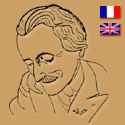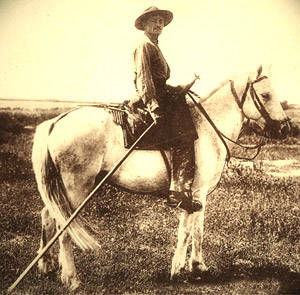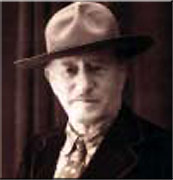| The Marquis Folco de Baroncelli |  |
| excerpts from “the poets I have known”: He is a horseman, or to put it better, a knight from home. Folco de Baroncelli, Marquis de Javon, Patricien de Florence, Citizen of Avignon, “lou Marquès” for all the people of Camargue… The residence of Roure is the one which, since the 15th century, had seen the Baroncelli who escaped from Florence live after the conspiracy of the Pazzi. He thought only of perpetuating the traditions still living and resuscitating those which, down through the ages, had fallen asleep. He worked for the glory of Provence, whose customs he saw with difficulty deteriorating and the old language fading away. Now, for this most noble task, he had a guide, a reliable master, the poet de Maillane; he went straight to him, the disciple declared himself immediately, opened the Palais du Roure to him. Mistral, for nine years, came to compose his felibrean combat diary with the tasty title “L’Aïoli” which he named Folco de Baroncelli le Baile, that is to say the guardian and the guide, the nurturer … For nine years, from 1891 to 1899, Folco de Baroncelli put, one can say it, and with what courage, the hand in the unctuous paste, which delighted Provençal appetites; Mistral brought there, from Maillane, the purest oil; young poets the condiment of their first verses; Father Xavier de Fourvière, with the white gesture of his monastic sleeve, blessed the holy table grouped together for the glory of the land.
He never wished for any title, he led a heroic and wise life in his paltry solitude, satisfied to reign as a comrade over the riders of the “nacioun Gardiano” to whom he had given life, to whom he left his soul, or at least a large part of his soul, because another is linked to this ancestral home of Roure where his heart has remained in the figurative sense, but also in the material sense of the word. This heart is there, according to his wish, in the Franciscan chapel, opposite that of Louis Le Cardonnel Folco with his blue or pink checkered shirt, his large gardian’s felt, with all the ardor and suppleness of a handsome rider, wielded his mount at will, as it remained until past seventy-two years, at the eve of his death.
When the circumstance required it, whether it was for the centenary of the Mistralien celebrated in Roure, in 1930, or in 1941 for the fiftieth anniversary of the newspaper “l’Aïoli”, of which he had been “baile” for eight years, that is to say To say editor-in-chief, he spoke because he was forced to do so and he could not shirk. But for him poetry and eloquence were above all action, and it is through action, through his attitude of an obstinate gardian, that he will remain in the eyes and the memory of the people of Languedoc and Provence. Sober in words and verse, he too has come to fruition in his life more than in his written work. He died in Avignon in December 1943, driven from his farmhouse, which the German occupation had made uninhabitable for him, in full awareness of his end, Christianity accepted. “Mai es aquèu passage of all aro, that asks me like vai estre!” ”
|
Folco de Baroncelli: Descendant of a former Florentine family that owned the Palais du Roure, which he sold in 1918 to Jeanne de Flandreysy. He then bought a farmhouse, horses, bulls, and led the harsh life of a Camargue gardian. The memory of the Marquis de Baroncelli is still very much alive at Saintes Maries de la Mer, for having defended the Camargue and its traditions and for having founded the “Nacioun Gardiano”.




